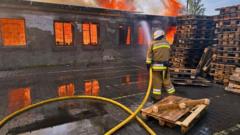The EU plans to cease all imports of Russian gas and LNG by the end of 2027, with strategies to enhance energy efficiency and diversify energy sources.
EU Asserts Baltic Energy Independence by 2027

EU Asserts Baltic Energy Independence by 2027
The European Commission sets a definitive timeline to terminate Russian energy imports amid ongoing geopolitical tensions.
The European Commission has revealed an ambitious "roadmap" to sever the European Union's energy dependence on Russia by the end of 2027. The initiative involves banning all imports of Russian gas and liquefied natural gas (LNG) to member states as a strategic move to prevent Russia from employing energy as a weapon in its conflicts. European Energy Commissioner Dan Jorgensen stated, "No more will we permit Russia to weaponise energy against us... No more will we indirectly help fill up the [Kremlin's] war chests," during a press event in Strasbourg.
In response, Kremlin spokesperson Dmitry Peskov remarked that Europe was "shooting itself in the foot" with these plans, highlighting the tensions that remain as a result of the war in Ukraine initiated by Russia in 2022. The EU has been gradually transitioning away from Russian energy since that invasion, and a set of legislative proposals will be introduced this June, calling on member states to develop "national plans" for phasing out not just gas, but nuclear fuel and oil imports as well.
Under the new directives, each EU nation will need to lay out a timeline to replace Russian oil imports and to reduce dependency on Russian uranium and enriched uranium in the nuclear sector. The European Commission aims to accomplish these objectives by promoting greater energy efficiency, increasing the deployment of renewable energy sources, and diversifying supply options. The reliance on Russian energy has already seen a decline, with imports of Russian gas dropping significantly from 45% in 2021 down to 19% anticipated in 2024, and oil from 27% to a mere 3%.
Despite these reductions, the report emphasizes the necessity of further diminishing reliance on Russian nuclear supplies, as well as the need to address potential threats to economic security that the remaining energy connections pose amid ongoing hostilities. Jorgensen noted that while the EU has made considerable progress, "we've come far, but not far enough." The roadmap promises a cautious and methodical approach to this energy transition to lessen associated economic impacts. Additionally, measures are to be implemented targeting Russia’s use of "shadow fleets"—oil tankers with questionable ownership and insurance—as an underground means of circumventing sanctions.
In response, Kremlin spokesperson Dmitry Peskov remarked that Europe was "shooting itself in the foot" with these plans, highlighting the tensions that remain as a result of the war in Ukraine initiated by Russia in 2022. The EU has been gradually transitioning away from Russian energy since that invasion, and a set of legislative proposals will be introduced this June, calling on member states to develop "national plans" for phasing out not just gas, but nuclear fuel and oil imports as well.
Under the new directives, each EU nation will need to lay out a timeline to replace Russian oil imports and to reduce dependency on Russian uranium and enriched uranium in the nuclear sector. The European Commission aims to accomplish these objectives by promoting greater energy efficiency, increasing the deployment of renewable energy sources, and diversifying supply options. The reliance on Russian energy has already seen a decline, with imports of Russian gas dropping significantly from 45% in 2021 down to 19% anticipated in 2024, and oil from 27% to a mere 3%.
Despite these reductions, the report emphasizes the necessity of further diminishing reliance on Russian nuclear supplies, as well as the need to address potential threats to economic security that the remaining energy connections pose amid ongoing hostilities. Jorgensen noted that while the EU has made considerable progress, "we've come far, but not far enough." The roadmap promises a cautious and methodical approach to this energy transition to lessen associated economic impacts. Additionally, measures are to be implemented targeting Russia’s use of "shadow fleets"—oil tankers with questionable ownership and insurance—as an underground means of circumventing sanctions.























